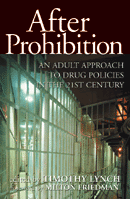“So you condone illegal drugs then?” – A Response
 Following my posting of “Coloradans Light Up 2014: Sale of marijuana for personal use legalised“, I was challenged: “So you condone illegal drugs then?” My response follows:
Following my posting of “Coloradans Light Up 2014: Sale of marijuana for personal use legalised“, I was challenged: “So you condone illegal drugs then?” My response follows:
The question of whether I “condone illegal drugs” presumes a relationship between one or more specific drugs and the law in a particular jurisdiction and at a specific time. After all, in Colorado, recreational use of marijuana is now legal; that is, under the laws of Colorado, it is now legal to produce, buy and sell and make use of marijuana but in London or even across its border into New Mexico or Utah, that same recreational use of marijuana remains illegal.
Whether use of a specific drug is good or bad – which I guess is what is meant by the “condoning” bit of the challenge – is a different matter, and must rely upon the judgement of the individual about their needs (including medical needs) and desires at a given moment: In Colorado “is using marijuana good or bad for me?” is pretty much the same question as asking in Colorado, or London for that matter, “is using alcohol good or bad for me?” Whilst I generally enjoy drinking alcohol, I recognise that there are times and some circumstances where it’s not enjoyable or advisable.
However, this pushes us back into considering jurisdictions again and also to note that legal rules can change over time as to what can and can’t be considered “legal”. The Prohibition Era made what is now legal for Americans over 21 to buy, alcohol, illegal for all Americans. Today, it’s legal for an 18 year old to buy and drink alcohol in London (and the rest of the UK) but not in Colorado (or the rest of the US) where you have to be over 21; other countries ban alcohol altogether for any age.
But even the 18 age requirement has caveats; whilst it’s illegal for 16 and 17 year olds to buy a pint and drink in a bar, in England or Wales, it is legal for them to drink (but not to buy) beer, cider and wine over a meal whilst seated in a restaurant or bar. So alcohol for a 16 year old can simultaneously be both a “legal” and an “illegal” drug; the legality being determined by the laws of that jurisdiction and the specific circumstances of that situation. The same holds true of how marijuana has been legalised in Colorado; there are specific rules governing/determining what is “legal” and what is “illegal” use. Going back to the original question, “So you condone illegal drugs then?” it seems apparent that it would have to be rewritten as “So you condone illegal/legal drugs then?” or, more clearly, “So you condone a drug that is at once both legal and illegal then?”
There is another way to consider the challenge, and that’s the question of context. The NHS makes widespread use of opiates – like morphine – in managing pain. For you and me, it is illegal to buy opiates on the street; but it is legal to have them prescribed by the medical profession. If we support the directed use of opiates by healthcare professionals for pain relief do we then find ourselves in a position where we “condone illegal drugs”? Further, those legal changes mentioned earlier also impact on who can or cannot legally administer a particular drug; after all, opium was legal in Britain (as was marijuana) until legislative changes, which largely began in the 1920s, eventually made its use illegal – except as directed by medics.
 As to the challenge, “So you condone illegal drugs then?” I think it misses the key issue here. The “War on Drugs”, as I and many others contend, has ridden roughshod over our social institutions and brought lasting pain and suffering to far too many – and not only has failed to effectively help those it professes to help but has systematically added to their misery and compounded the hardships of their families and communities. For me, politicians should look to base the public policy for a free society – which we claim to be – on proper principles of reducing individual and social harm, whilst widening the scope of human liberty and personal responsibility. Colorado’s legalisation of marijuana marks, therefore, an important step forward.
As to the challenge, “So you condone illegal drugs then?” I think it misses the key issue here. The “War on Drugs”, as I and many others contend, has ridden roughshod over our social institutions and brought lasting pain and suffering to far too many – and not only has failed to effectively help those it professes to help but has systematically added to their misery and compounded the hardships of their families and communities. For me, politicians should look to base the public policy for a free society – which we claim to be – on proper principles of reducing individual and social harm, whilst widening the scope of human liberty and personal responsibility. Colorado’s legalisation of marijuana marks, therefore, an important step forward.